新目标英语七年级(下)知识归纳
七年级英语人教版(新目标)(最新版)下学期期末复习:知识点归纳
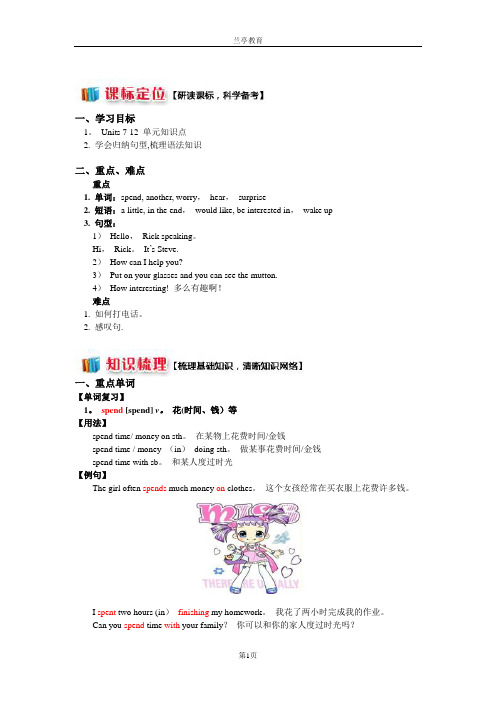
一、学习目标1。
Units 7-12 单元知识点2. 学会归纳句型,梳理语法知识二、重点、难点重点1. 单词:spend, another, worry,hear,surprise2. 短语:a little, in the end,would like, be interested in,wake up3. 句型:1)Hello,Rick speaking。
Hi,Rick。
It’s Steve.2)How can I help you?3)Put on your glasses and you can see the mutton.4)How interesting! 多么有趣啊!难点1. 如何打电话。
2. 感叹句.一、重点单词【单词复习】1。
spend [spend] v。
花(时间、钱)等【用法】spend time/ money on sth。
在某物上花费时间/金钱spend time / money (in)doing sth。
做某事花费时间/金钱spend time with sb。
和某人度过时光【例句】The girl often spends much money on clothes。
这个女孩经常在买衣服上花费许多钱。
I spent two hours (in)finishing my homework。
我花了两小时完成我的作业。
Can you spend time with your family?你可以和你的家人度过时光吗?【拓展】(1) pay常用来表示“付款”,主语是人,其后用介词for。
sb。
pays money for sth. = sb。
spends money on/ doing sth。
(2)cost 表示“花钱”,主语为物。
sth。
costs sb. money. = sb. pays money for sth。
= sb。
spends money on/(in)doing sth。
新目标英语七年级(下)Unit_11知识要点归纳
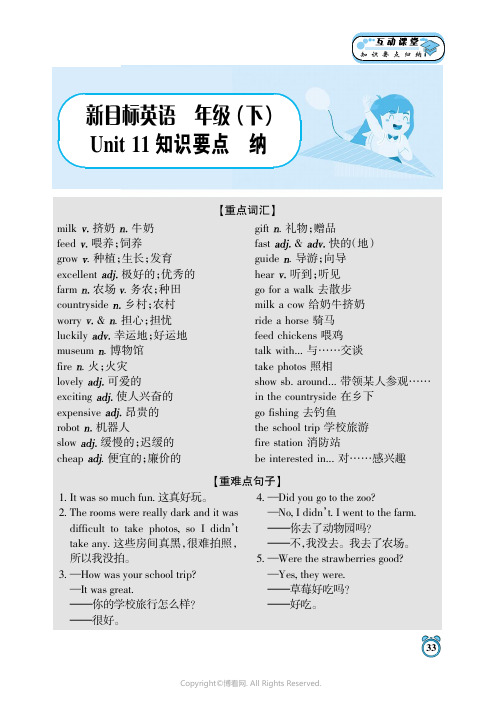
栏纳milk 挤奶牛奶feed 喂养;饲养grow .种植;生长;发育excellent 极好的;优秀的farm 农场.务农;种田countryside 乡村;农村worry &.担心;担忧luckily 幸运地;好运地museum .博物馆fire .火;火灾lovely 可爱的exciting 使人兴奋的expensive 昂贵的robot 机器人slow 缓慢的;迟缓的cheap .便宜的;廉价的gift .礼物;赠品fast &快的(地)guide .导游;向导hear 听到;听见go for a walk 去散步milk a cow 给奶牛挤奶ride a horse 骑马feed chickens 喂鸡talk with...与……交谈take photos 照相show sb.around...带领某人参观……in the countryside 在乡下go fishing 去钓鱼the school trip 学校旅游fire station 消防站be interested in...对……感兴趣1.It was so much fun.这真好玩。
2.The rooms were really dark and it was difficult to take photos,so I didn ’t take any.这些房间真黑,很难拍照,所以我没拍。
3.—How was your school trip?—It was great.———你的学校旅行怎么样?———很好。
4.—Did you go to the zoo?—No,I didn ’t.I went to the farm.———你去了动物园吗?———不,我没去。
我去了农场。
5.—Were the strawberries good?—Yes,they were.———草莓好吃吗?———好吃。
【重点词汇】【重难点句子】33Copyright ©博看网. All Rights Reserved.。
人教版新目标七年级下册Unit1_12重点短语及句型归纳
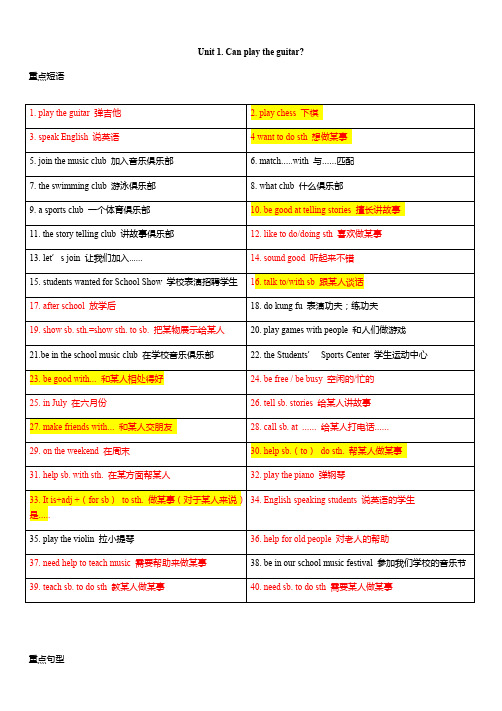
Unit 1. Can play the guitar?重点短语重点句型1. —Can you swim?你会游泳吗?—No,I can’t.不,我不会。
2. Can you play the guitar?你会弹吉他吗?3. I want to join the art club.我想参加艺术俱乐部.4. What club do you want to join?你想参加什么俱乐部?5. You are very good at telling stories.你非常擅长讲故事。
6. Sounds good. But I like to draw,too.听起来不错。
但我也喜欢画画。
7. Then join two clubs—the story telling club and the art club!那么就请加人两个俱乐部——讲故事俱乐部和艺术俱乐部。
8. 一Can Wu Jun speak English?吴俊会讲英语吗?一No,he can’t, but he can speak Chinese.不会,但他会讲汉语。
9. Are you good with old people?你与老人们相处得融洽吗?10. Can you play the piano or the violin?你会弹钢琴还是会拉小提琴?Unit 2 What time do you go to school?重点短语重点句型1. What time do you go to school?你几点去上学?2. 一What time do you usually take a shower,Kick?瑞克,你通常几点钟淋浴?—I usually take a shower at six forty.我通常六点四十淋浴。
3. 一When do you go to work? 你什么时候去上班?一At eleven o’clock, so I’m never late for work.十一点,我上班从来没有迟到4. —What time do they get dressed?他们几点钟穿上衣服?一They always get dressed at seven twenty.他们总是七点二十穿上衣服。
新版新目标英语七年级下册知识点总结
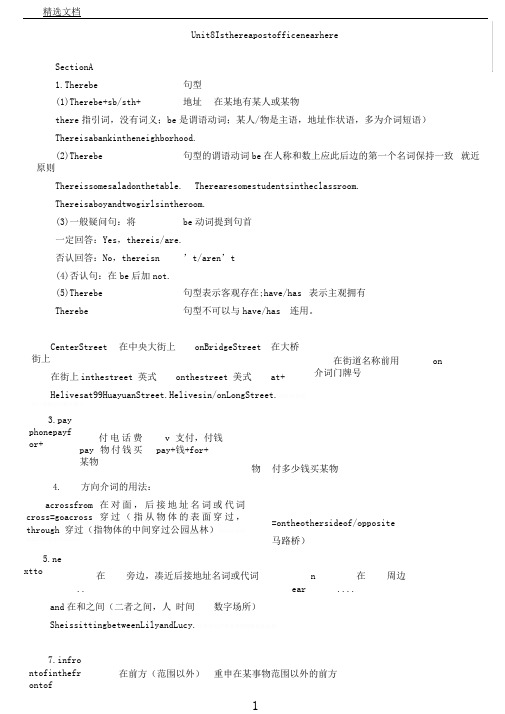
Unit8IsthereapostofficenearhereSectionA1.Therebe 句型(1)Therebe+sb/sth+ 地址在某地有某人或某物there指引词,没有词义;be是谓语动词;某人/物是主语,地址作状语,多为介词短语)Thereisabankintheneighborhood.(2)Therebe 句型的谓语动词be在人称和数上应此后边的第一个名词保持一致就近原则Thereissomesaladonthetable. Therearesomestudentsintheclassroom.Thereisaboyandtwogirlsintheroom.(3)一般疑问句:将be动词提到句首一定回答:Yes,thereis/are.否认回答:No,thereisn ’t/aren’t(4)否认句:在be后加not.(5)Therebe 句型表示客观存在;have/has 表示主观拥有Therebe 句型不可以与have/has 连用。
CenterStreet 在中央大街上onBridgeStreet 在大桥街上在街上inthestreet 英式onthestreet 美式at+ Helivesat99HuayuanStreet.Helivesin/onLongStreet.在街道名称前用介词门牌号on3.payphonepayf or+付电话费pay物付钱买某物v支付,付钱pay+钱+for+物付多少钱买某物4.方向介词的用法:acrossfrom在对面,后接地址名词或代词cross=goacross穿过(指从物体的表面穿过,through穿过(指物体的中间穿过公园丛林)=ontheothersideof/opposite马路桥)5.nextto在..旁边,凑近后接地址名词或代词near在....周边and在和之间(二者之间,人时间数字场所)SheissittingbetweenLilyandLucy.7.infrontofinthefrontof在前方(范围以外)重申在某事物范围以外的前方在..前方(范围以内)重申在某事物范围内的前方me打搅了,对不起屈驾因咨询事情,打搅他人而表示抱歉时的用语,常用在问路以前。
新目标英语七年级(下)Unit_7知汉要点归纳

知1.—How is the weather?—It’s raining./It’s sunny.———天气怎么样?———天下雨了。
/天气晴朗。
2.—How’s it going?—It’s great.———最近怎么样?———很好。
3.—What are they doing?—They’re playing basketball inthe park.———他们在干什么?———他们正在公园里打篮球。
4.—What’s John doing now?—He’s playing soccer.He playssoccer every day.———约翰现在在干什么?———他在踢足球。
他每天都踢足球。
【重点词汇】1.rain.下雨.雨水15.snow下雪.雪2.windy有风的;多风的16.cloudy多云的3.sunny.晴朗的17.weather.天气4.dry干燥的18.cold寒冷的;冷的5.hot热的19.warm温暖的6.soon不久;很快20.hard努力地困难的7.skate滑冰21.visit拜访;参观8.message信息;消息22.summer.夏天;夏季9.winter冬天;冬季23.vacation假期10.take a message捎个口信;传话24.call(sb.)back(给某人)回电话11.have a good time玩得开心25.on(a)vacation度假12.right now此刻;马上26.no problem没有问题13.study hard努力学习27.visit friends拜访朋友14.not too bad不算太坏28.play computer games玩电脑游戏【重难点句子】32Copyright©博看网. All Rights Reserved.。
新目标英语七年级(下)1-12单元必背句子与短语

七下1—6单元必背句子与词组Unit1 Where’s your pen pal from? (ok)1. --你的笔友来自哪里? -- Where is your pen pal from? (无―实义动词come, 用is/are‖) --他来自加拿大。
-- He/She is from Canada.同义句:-- Where does your pen pal come from? (有―实义动词come, 用do/does‖) -- He/She comes from Canada.来自:be from = come from练:They’re _______ Australia, a beautiful country.A. come fromB. comes fromC. fromD. for2. --你的笔友来自加拿大吗?-- Is your pen pal from Canada? (用法同上)--是的。
-- Yes, he/she is.同义句:-- Does your pen pal come from Canada? (用法同上) -- Yes, he/she does.3. 他来自澳大利亚:He is from Australia. 他是澳大利亚人:He is Australian.4. --你的笔友住在哪里?-- Where does your pen pal live?--他住在多伦多。
-- He/She lives in Toronto.居住在某地:live in sp练:-- When _____ the girl _____ her homework? -- In the evening.A. does, doesB. does, doC. is, doD. is, does-- _______ your sister have a pen pal? Yes, she _______.A. Is, isB. Does, doC. Can, canD. Does, does-- Ling Tao is a Chinese, but now he _______ in the UK.A. liveB. isC. is fromD. comes from5. --你的笔友说什么语言?-- What language does your pen pal speak?--他说英语。
新目标(Go for it)版七年级英语下册各单元知识点总结
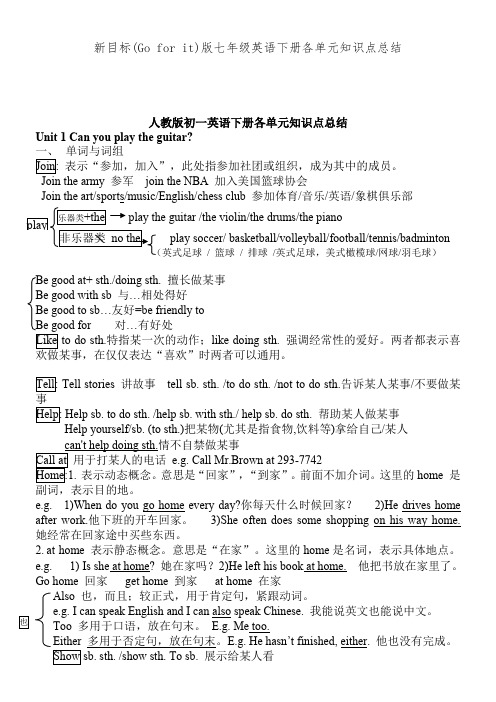
新目标(Go for it)版七年级英语下册各单元知识点总结人教版初一英语下册各单元知识点总结Unit 1 Can you play the guitar?一、 单词与词组表示“参加,加入”,此处指参加社团或组织,成为其中的成员。
Join the army 参军 join the NBA 加入美国篮球协会Join the art/sports/music/English/chess club 参加体育/音乐/英语/象棋俱乐部play soccer/ basketball/volleyball/football/tennis/badminton / 篮球 / 排球 /英式足球,美式橄榄球/网球/羽毛球)Be good at+ sth./doing sth. 擅长做某事Be good with sb 与…相处得好Be good to sb …友好=be friendly toBe good for 对…有好处特指某一次的动作;like doing sth. 强调经常性的爱好。
两者都表示喜讲故事 tell sb. sth. /to do sth. /not to do sth.告诉某人某事/不要做某帮助某人做某事Help yourself/sb. (to sth.)把某物(尤其是指食物,饮料等)拿给自己/某人e.g. Call Mr.Brown at 293-7742意思是“回家”,“到家”。
前面不加介词。
这里的home 是e.g. 1)When do you go home every day?你每天什么时候回家? 2)He drives home after work.他下班的开车回家。
3)She often does some shopping on his way home. 她经常在回家途中买些东西。
2. at home 表示静态概念。
意思是“在家”。
这里的home 是名词,表示具体地点。
新目标初一英语下知识总结及练习答案讲解

七年级英语提高训练一Unit 1 Can you play the guitar学校:年级:姓名:一.基础知识梳理A: Can you draw B: Yes, I can. I want to join the art club.C: Can you swim D: No, I can’t.E: Oh, can you sing F: Yes, I can. I want to join the music club. D.考点语法:情态动词can的使用1.表示能力,表“会”“能”,指脑力或体力方面的“能力”--- I can play basketball well.2.表示许可----You can’t play here.3.表“请求”--- Can you help me二.基础知识运用1.根据首字母和句意提示完成单词;1. He likes playing basketball. So he wants to join_______ the basketball club.2. ---Can you speak_____ English ---Yes, I can.3. I can paint. I want to join the art club.4. I can play the guitar and the volin. I can sing and dance, talk.5. Do you have time on the weekend .6. If you are a good musician, you can be in the music festival festival.7. What can you do in the school show8. Which do you like, English or Chinese2.单项选择B 1. ----Can you ----Yes. I am in the art club now.A. swimB. paintC. danceD. singD 2. ----Can you play the guitar ----Yes. But I can’t play it very.A. badB. badlyC. goodD. Wellvery good相当于very nice. 意思是非常好,用来修饰名词.例子:The book is very good/nice.这本书非常好.very well 意思也是非常好,但它有两个用途:1.表示人的身体很好,属于形容词性短语,仅限于表示人的身体好,假如你跟一个人偶遇,他就想问问你认识的某人身体咋样,那你就可以回答说谁谁谁very well.例子:My mother is very well.我妈妈身体很好.2.还可以用来表示很好地,这时候它就相当于一个副词,可以用来修饰动词和形容词.例子:He study English very well.他的英语学得非常好.A 3. ---- ----Chess club.A. What club do you want to joinB. Can you play the chessC. What can you doD. Do you join the chess clubB 4. ----Do you know Lang Lang ---Yes. He is a . He can play the piano very well.A. playerB. musicianC. teacherD. singerC 5. ----How is your school trip ----Great. I can you the photos.A. makeB. findC. showD. buyD 6. ----Can you me with my English ---OK.A. learnB. speakC. teachD. Help help with 帮助B 7. ----Can your friend, Tony, the trumpet 喇叭;小号----Yes. He likes it very much.A. play; playsB. play; playingC. plays; playsD. plays; playingyour friend和Tony之间是同位关系,实际上该句子相当于:Can your friend play the trumpet 当表示喜欢某事物,而且以前就喜欢,还可能持续,用Like doing sth当表示想要,欲做某事用like to doB 8. ---What does he like doing after school ---Playing .A. gameB. chessC. the tennisD. Swimminggamesc 9. ----Can I help you --- I want to buy a book.A. No, thanksB. Thanks a lot 十分感谢C. Yes, please.D. You’re welcome 不客气thank you 或者Thanks a lot用这个回答A 10. Can he EnglishlA. speakB. talkC. sayspeak 意为“说话、讲话”,后面主要接语言.如:He can speak English and a little Chinese.talk 意为“谈话、讲话”,如果只有一方对另一方说话时,一般用talk to;如果双方或多方交谈,多用with. say 意为“说”通常跟讲者所说的话一起使用Please say hello / thank you to your mum.B 11. My brothers want the chess club.A. to speakB. to joinC. joinswant to do想做某事,want意思是“想要”,主语常是人I want to go to schoolwant doing 需要做某事,want意思是“需要、要求”,主语常是物The house wants repairingC 12. ----Can you play the guitar ----A. No, I canB. Sure, I can’tC. Yes, a little.B 13. My sister can very well. So she wants to join the club.A. swims; swimmingB. swim; swimmingC. swimming; swimC 14. _______club do you want to joinA. WhenB. WhereC. WhatC 15. I don’t want to play _____violin. Let’s go and play ________ ping-pong.A. a; theB. the; aC. the; /接球类和棋类时不加冠词,如:play football, play ping-pong,play chess;接乐器时加定冠词the,如play the violeen 中国的乐器前不加冠词;3. 交际技能及运用C D A F B EB.Mrs. Black: What can I do for you, young manDavid: I like sports. I want to Join your Sports Club .Mrs. Black: OK. What’s your full name, pleaseDavid: David Cooper.Mrs. Black: HOW OLD ARE YOUDavid: 14.Mrs. Black: What’s your favorite sport Can you play tennisDavid: Yes, I can.Mrs. Black: Do you like playing basketballDavid: Yes, but I CAN’T play it very well.Mrs. Black: Why do you want to join the club, may I askDavid: Because I really want to keep healthy and meet/make friends .Mrs. Black: Oh, I see. Can I have your phone number and email addressMrs. Black: OK. Welcome to our sports club.You can come hereon Sunday .at, in , on, 和by 表示时间的区别:at指时间表示:1时间的一点,一时刻:They come home at surprise at noon, at midnight, at ten o’clock, at daybreak, at dawn.2 较短的一段时间;可指某个节日或认为一年中标志大事的日子;His grandfather died at seventy-two.At the beginning middle, end of that month he was sick.He went home at Christmas at New Year, at the spring Festival, at night, at midsummer.In指时间表示:1在某个较长的时间如世纪,朝代,年,月,季节,及泛指的上午,下午和晚上等内;He died in the holidays.He was born in 1942.2 在一段时间之后;He will come round in a day or two.I will finish it in three hours.On指时间表示:1具体的时日和一个特定的时间,如某日,某节日,星期几等;He will come to meet us on our arrival.On May 4th On Sunday, On New Year’s day, On Christmas Day, there will be a celebration.2 在某个特定的早晨,下午或晚上;He arrived at 10 o’clock on the night of the 5th.He died on the eve of victory.3 准时,按时;If the rain should be on time, I should reach home before dark.In 表示比较大的地方,2虽然是很小的地方,如果说话人住在那里,也可用in.商店,机关,学校等,若看作一个地点point用at,若看作一个场所place用in.I met him at the post-office.I’m now working in the post-office.On表示地点,一般指与面或线接触:1“在…上面”He put the book on the table and sat on the chair.The picture was hanging on the wall.2 “在……旁边”New work is on the Hudson River.Xiamen is on the river.He lives in a house on the river.1. near, by, beside, at表示“在附近”的区别:near 表示相对的“近”,实际距离可能还很远;例如:There is a post office near our school.Suzhou is near Shanghai.By和beside都表示“靠近”,实际距离不可能很远,但beside比by更具体的表示出“在旁边”的意思;例如:There is a big tree by the river.He was sitting beside her.by还可以表示“尺寸,距离”;例如:They escaped death by inches.Do you see the hole high up in the wall, about 18 cm by 9三.能力提高训练Rick is a fat man. He gets up late晚in the morning . He has a big breakfast every morning. He has some meat, three or four eggs and some pieces of bread面包. He drinks two glasses of milk, some apple juice, a cup of coffee and some fruit. His wife, Vicky, has a cup of tea, a piece of bread and a banana for breakfast. Rick doesn’t like any ball games. He thinks they are too hard for him, but he likes listening to the music and watching TV and he doesn’t do any housework家务. Vicky plays sports every day. In fact, she is in a swimming club. So she is very healthy .1. K2. A3. D4. H5. B6. C7. I8. E9. G 10. J2. 阅读理解Do you like children Do you have free空闲的time in the afternoon We need a babysitter保姆for our son. He’s five years old. The working time is Monday to Friday, 3:00 pm to 6:pm. $ 5 an hourWe need help with: Looking after our son; Reading to him; Playing with him.You must work at our house. We live in Changchun, near the Culture Square文化广场. Please call Mr. Green at 5638—2949.根据短文内容选择正确答案1. From Monday to Friday, the babysitter can work ______ every day.A. one hourB. two hoursC. three hoursD. four hours2. Which is NOT the work that the babysitter needs to doA. Cooking for the child.B. Playing with the child.C. Reading books to the child.D. Looking after the child.3. The babysitter must work _______.A. at the babysitter’s houseB. at Miss Green’s school.C. at Mr. Green’s house.D. at the Culture Square4. The child in the ad is _______.A. 15 months oldB. 15 years oldC. 5 months oldD. 5 years old5. If ______, you can get the job.A. you like children, but you have no time in the afternoonB. you like children, but you d on’t know how to play with themC. you’re good with children and you’re free in the afternoonD. you can play with children but you don’t know how to readC A CD CA下面是俱乐部的广告,以及学生对自己能力的表述;这些学生应该加入什么社团请在横线上写下对应的俱_______ Kate: My friends and I really like helping others._______ Mike: Cooking is boring. I love music and I can play the piano._______ Gina: I can’t play sports, and I can’t cook, but I can speak a little French._______ Jack: I can play chess a little. But I really want to be a chess player._______ S cott: I like Jet Li and I’m really interested in Chinese kung fu.1.E2.B3.A5.DB根据俱乐部广告信息,判断正误. 正确的写“T”,错误的写“F”6. If you like Chinese kung fu, you can call Mr. King at 8491-3086.7. You can learn to speak French every Thursday.8. We can join the volunteer club to make the old people happy.9. I love cooking and I can cook in Room 302 every Tuesday.10. If you like drawing pictures, you can join the music club.6.F 7.F 8.T家庭作业一、句型转换1. I can join in the Chinese speech contest. 改为一般疑问句___can_____ ____i____ ____join___ in the Chinese speech contest2. Can Jack and his brother speak Chinese 做否定回答No,____they___ _____can’t___.3. Jimmy can sing Jay Chou's songs. 改为否定句Jimmy __can’t_____ __sing_____ Jay Chou's songs.4. He wants to join the math club. 就划线部分提问_what_____ ___club_____ ___does____ he __want____ to join5. His sister can play computer games. 就划线部分提问____what___ ___can_____ his sister ____do____二.阅读理解Mr Brown and Mrs Brown are teachers. But they teach in different schools. Every day Mrs Brown goes home early. Mr Brown's school is not near their home. He goes home late. Mr Brown likes Chinese. He often goes to Chinese classes. One day he has a friendly talk with a Chinese student and goes home very late.He opens the door and says, "Sorry, my dear. I am too late today, but I..." Mrs Brown is not in the room."That's strange 奇怪. She likes watching TV." "She doesn't like going out in the evening." "But where is she now." Mr Brown looks here and there. Then he sees a note on the table. It says, "Don't make any excuse this time, I am going out to see my friends. Don't wait for me."b 1. Mr Brown and Mrs Brown are teachers, and they workA. in the same schoolB. in two different schoolsC. in different countriesD. in one schoolb 2. Mr Brown goes home late becauseA. he doesn't like his homeB. his school isn't nearC. he likes dancingD. he likes school very muchc 3. One day, Mr Brown has a friendly talk withA. Mrs BrownB. his studentsC. a Chinese studentD. his good friendc 4. Mr Brown wants to say sorry to Mrs Brown, but Mrs BrownA. doesn't want to listen and goes to bed earlyB. isn't at home to wait for his excuseC. is sleeping and can't hear himD. is very angry and leaves home for everb 5. Mr Brown thinks that Mrs Brown _____ in the evening.A.often goes outB. stays at homeC. is cookingD. doesn't watch TV二、补全对话,一空一词A: Hi, Emma What time do you usually get up onB: Well, I get up at six forty-five.A: Do you have at homeB: Yes, I usually have an egg, a hamburger and some fruit.A: _____ do you go to schoolB: Classes begin_____ at eight-thirty, so I go to school at eight-ten.A: How classes do you have every dayB: Seven. Four in the morning and in the afternoon.A: 7. ____what___ do you do after schoolB: We sports. We like volleyball very much.A: When do you getB: I school at five-thirty and I get home at six o’clock。
七年级下册英语语法点总结(新目标)

七年级下册英语语法点总结Unit 1 Where’s your pen pal from?一.短语:1 .be from = come from 来自于----2.live in 居住在---3.on weekends 在周末4 .write to sb = write a letter to sb 给某人写信;写信给某人5 .in the world 在世界上in China 在中国6.pen pal 笔友14 years old 14岁favorite subject 最喜欢的科目7.the United States 美国the United Kingdom 英国New York 纽约8.speak English 讲英语like and dislike 爱憎9.go to the movies 去看电影play sports 做运动二.重点句式:1 Where’s your pen pal from? = Where does your pen pal from/2 Where does he live?3 What language(s) does he speak?4 I want a pen pal in China.5 I can speak English and a little French.6 Please write and tell me about yourself.7 Can you write to me soon?8 I like going to the movies with my friends and playing sports.三.本单元的国家,人民、语言对应。
1 Canada---- Canadian---- English / French2 France------ French------French3 Japan------Japanese----Japanese4 Australia----Australian----- English5 the United States------ American---- English6 the United Kingdom---British----- EnghishUnit 2 Where’s the post offic e?一.Asking ways: (问路)1.Where is (the nearest) ……?(最近的)……在哪里?2.Can you tell me the way to ……?你能告诉我去……的路吗?3.How can I get to ……?我怎样到达……呢?4.Is there …… near here / in the neighborhood? 附近有……吗?5.Which is the way to ……?哪条是去……的路?二.Showing the ways: (指路)1. Go straight down / along this street. 沿着这条街一直走。
人教版新目标英语七年级下册:Un...

⼈教版新⽬标英语七年级下册:Un...教师辅导讲义教学内容新课知识◆短语归纳1. what time ⼏点2. go to school 去上学3. get up 起床4. take a shower 洗淋浴5. brush teeth 刷⽛6. get to 到达7. do homework 做家庭作业8. go to work 去上班9.go home 回家10. have/eat breakfast 吃早饭11. get dressed 穿上⾐服12.get home 到家13. either…or… 要么…要么… 14. go to bed 上床睡觉15.get dressed 穿上⾐服16.go to school 去上学17.radio station ⼴播电视台18. take a walk 散步19. lots of=a lot of 许多,⼤量20. at night 在晚上21. be late for=arrive late for 迟到22.go shopping 去购物23.go on 继续24.go back 返回25.go over 仔细检查25. go away 离开26. in the morning/ afternoon/ evening 在上午/下午/晚上◆⽤法集萃1. at + 具体时间点在⼏点(⼏分)2. eat breakfast/ lunch/dinner 吃早饭/午饭/晚饭3. thirty\half past +基数词……点半4. fifteen\a quarter to +基数词差⼀刻到……点5. take a/an +名词从事……活动6. from …to … 从……到……7. need to do sth 需要做某事◆典句必背1. —What time do you usually get up? 你⼀般什么时候起床?—I usually get up at six thirty. 我通常6:30分起床。
七年级下册英语知识点归纳
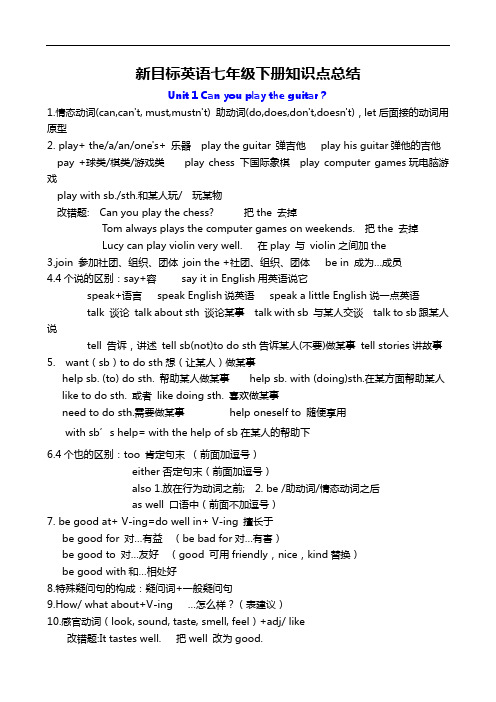
新目标英语七年级下册知识点总结Unit 1 Can you play the guitar?1.情态动词(can,can't, must,mustn't) 助动词(do,does,don't,doesn't),let后面接的动词用原型2. play+ the/a/an/one's+ 乐器play the guitar 弹吉他play his guitar弹他的吉他pay +球类/棋类/游戏类play chess 下国际象棋play computer games玩电脑游戏play with sb./sth.和某人玩/ 玩某物改错题: Can you play the chess? 把the 去掉Tom always plays the computer games on weekends. 把the 去掉Lucy can play violin very well. 在play 与violin之间加the3.join 参加社团、组织、团体join the +社团、组织、团体be in 成为…成员4.4个说的区别:say+容say it in English用英语说它speak+语言speak English说英语speak a little English说一点英语talk 谈论talk about sth 谈论某事talk with sb 与某人交谈talk to sb跟某人说tell 告诉,讲述tell sb(not)to do sth告诉某人(不要)做某事tell stories讲故事5. want(sb)to do sth想(让某人)做某事help sb. (to) do sth. 帮助某人做某事help sb. with (doing)sth.在某方面帮助某人like to do sth. 或者like doing sth. 喜欢做某事need to do sth.需要做某事help oneself to 随便享用with sb’s help= with the help of sb在某人的帮助下6.4个也的区别:too 肯定句末(前面加逗号)either否定句末(前面加逗号)also 1.放在行为动词之前; 2. be /助动词/情态动词之后as well 口语中(前面不加逗号)7. be good at+ V-ing=do well in+ V-ing 擅长于be good for 对…有益(be bad for对…有害)be good to 对…友好(good 可用friendly,nice,kind替换)be good with和…相处好8.特殊疑问句的构成:疑问词+一般疑问句9.How/ what about+V-ing …怎么样?(表建议)10.感官动词(look, sound, taste, smell, feel)+adj/ like改错题:It tastes well. 把well 改为good.11.选择疑问句:回答不能直接用Yes或者No,要从中选择一个回答Can you play the guitar or the violin?I can play the guitar.不能用yes或者no来回答12.students wanted for school show(wanted表示招募,含有被动意义)13.把某物展示给某人看show sth to sb=show sb sth 给某人展示某物把某物给予某人give sth to sb=give sb sth给予某人某物买某物给某人buy sth for sb.=buy sb sth给某人买某物14.be busy doing sth/ be busy with sth忙着做某事15.be free= have time有时间,有空16.have friends= make friends交朋友17.call sb at + 拨打…找某人18.on the weekend= on weekends在周末19.English-speaking students 说英语的学生(带有连词符,有形容词性质)20.do kung fu表演功夫Unit 2 What time do you go to school?1.问时间用what time几点?询问时刻,钟点when什么时候,几点..what time is it?=What is the time?几点了?at+钟点at 7 o’clock at noon/ at night(during/ in the day)on+ 具体某天、星期、特指的一天on April 1st on Sunday on school mornings/nightsin +年、月、上午、下午、晚上2.时间读法:顺读法at eight five 在8:05分eight thirty 8:30 eight fifteen 8:15逆读法:分钟≤30用past five past eight(8:05)half past eight(8:30)分钟>30用to a quarter to ten(9:45)整点用…o’clock 7 o’clock(7:00)3.3个穿的区别:wear 表状态,接服装、手套、眼镜、香水等put on 表动作,接服装dress 表动作,接sb/ oneself 给某人穿衣服get dressed穿衣4.from…to…从.…到…between…and…在…和…之间either…or…要么…要么5.(be/ arrive) late for (school/class/work)6.频度副词(1.放在行为动词前2.放在be /助动词/情态动词后)always总是usually通常often经常sometimes有时never决不7.一段时间前面要用介词for for half an hour持续半个小时wait for hours for the bus等公车等了数小时8.eat/ have+食物+for+breakfast/ lunch/ dinner/ suppereat/have+breakfast/ lunch/ dinner/ suppereat/have+a/an+形容词+breakfast/ lunch/ dinner/ supper吃一个有营养的早餐have a good/great breakfast8.either…or 连接两个主语时,遵循就近原则(1) Either Tony or his sisters wash the dishes.此句与wash接近的主语是sisters,复数形式,用原型(2) Either Tony's sisters or Tony washes the dishes.此句与wash接近的主语是Tony,单数形式,所以动词用三单形式,以sh结尾的动词,加es.9.a lot of=lots of "许多,大量" 后面接可数名词的复数,或者不可数名词some 一些,后面接可数名词的复数,或者不可数名词many许多、大量,修饰可数名词复数too many太多,修饰可数名词复数much许多、大量,修饰不可数名词too much太多,修饰不可数名词much too“实在太”修饰形容词或副词10.It is +adj+for sb +to do sth (adj修饰to do sth)做某事对于某人来说……It is important for me to learn English. 学英语对于我来说很重要。
人教新目标初中英语七年级下册Unit1知识点归纳

人教版英语七年级下册Unit1 Can you play the guitar?知识点归纳1.play chess下国际象棋play与棋牌类或球类名词连用,表示“参加…”。
棋牌类、球类名词前不加冠词。
play basketball 打篮球play soccer/football 踢足球play volleyball 打排球play cards 打牌play chess 下国际象棋2. speak English 说英语speak 用作及物动词,意为“说(某种语言)”,后常接表示语言的名词作宾语。
speak Chinese 说汉语speak French 说法语【拓展】speak 还可用作不及物动词,意为“说话”,通常指说话的能力或方式;还可表示“演讲,发言”之意。
speak to sb. 意为“对某人说话”。
May I speak to Lucy? 我可以和露西通话吗?The child can't speak. 这个孩子不会说话。
Who will speak at the meeting? 谁将在会上发言?3.play the guitar 弹吉他(教材第1页)play与乐器类名词连用,表示“演奏、弹奏、吹奏”,此时名词前必须加定冠词the.play the guitar弹吉他play the violin 拉小提琴play the piano 弹钢琴play the drums 敲鼓play the erhu拉二胡4.I want to join the art club. 我想加入美术社团。
(1) want to do sth. 意为“想要做某事”。
I want to see my grandparents next Sunday.下周日我想去看望我的爷爷奶奶。
【拓展】want的其他用法:1)want sth. 意为“想要某物”。
I want a new sweater. 我想要一件新毛衣。
《新目标英语》七年级下册 重点句型短语归纳
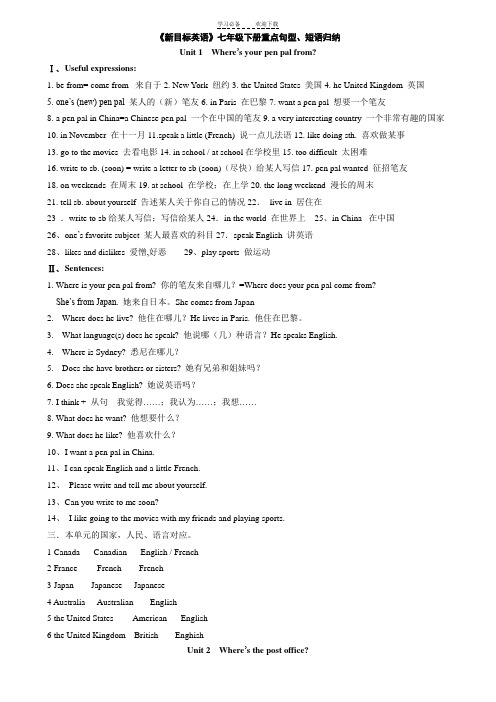
《新目标英语》七年级下册重点句型、短语归纳Unit 1 Where’s your pen pal from?Ⅰ、Useful expressions:1. be from= come from 来自于2. New York 纽约3. the United States 美国4. he United Kingdom 英国5. one’s (new) pen pal 某人的(新)笔友6. in Paris 在巴黎7. want a pen pal 想要一个笔友8. a pen pal in China=a Chinese pen pal 一个在中国的笔友9. a very interesting country 一个非常有趣的国家10. in November 在十一月11.speak a little (French) 说一点儿法语12. like doing sth. 喜欢做某事13. go to the movies 去看电影14. in school / at school在学校里15. too difficult 太困难16. write to sb. (soon) = write a letter to sb (soon)(尽快)给某人写信17. pen pal wanted 征招笔友18. on weekends 在周末19. at school 在学校;在上学20. the long weekend 漫长的周末21. tell sb. about yourself 告述某人关于你自己的情况22.live in 居住在---23 .write to sb给某人写信;写信给某人24.in the world 在世界上25、in China 在中国26、one’s favorite subject 某人最喜欢的科目27.speak English 讲英语28、likes and dislikes 爱憎,好恶29、play sports 做运动Ⅱ、Sentences:1. Where is your pen pal from? 你的笔友来自哪儿?=Where does your pen pal come from?She’s from Japan. 她来自日本。
新目标英语七年级(下)Unit 1重点归纳与基础知识一体化练习
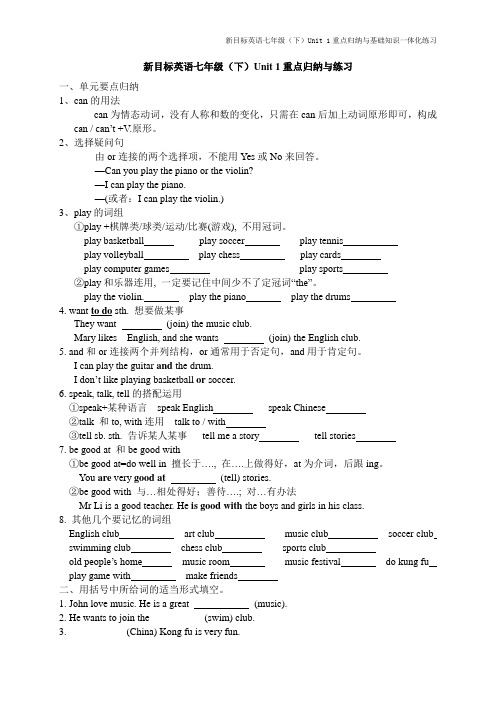
新目标英语七年级(下)Unit 1重点归纳与练习一、单元要点归纳1、can的用法can为情态动词,没有人称和数的变化,只需在can后加上动词原形即可,构成can / can’t +V.原形。
2、选择疑问句由or连接的两个选择项,不能用Yes或No来回答。
—Can you play the piano or the violin?—I can play the piano.—(或者:I can play the violin.)3、play的词组①play +棋牌类/球类/运动/比赛(游戏), 不用冠词。
play basketball play soccer play tennisplay volleyball play chess play cardsplay computer games play sports②play和乐器连用, 一定要记住中间少不了定冠词“the”。
play the violin. play the piano play the drums4. want to do sth. 想要做某事They want (join) the music club.Mary likes English, and she wants (join) the English club.5. and和or连接两个并列结构,or通常用于否定句,and用于肯定句。
I can play the guitar and the drum.I don’t like playing basketball or soccer.6. speak, talk, tell的搭配运用①speak+某种语言speak English speak Chinese②talk 和to, with连用talk to / with③tell sb. sth. 告诉某人某事tell me a story tell stories7. be good at 和be good with①be good at=do well in 擅长于…., 在….上做得好,at为介词,后跟ing。
新目标go,for,it,七年级下册单元单词及知识点

新目标go,for,it,七年级下册单元单词及知识点篇一:新版新目标英语七年级下册各单元知识点汇总新版新目标英语七年级下册各单元知识点汇总Unit 1 Can you play the guitar1. guitar为一种乐器,注意play与表示乐器的名词连用时,前要加定冠词the。
2. join意为―参加(某个组织成为其成员)‖,一般常和介词in连用。
3. have a swim游泳;go swimming去游泳4. ―下棋‖用play chess,而不用play the chess。
5. Painted 派生词:painter n.画家 painting n.画(注意与draw的区别: paint指用颜料等绘画;而draw指用钢笔、铅笔等画。
)6. 注意区分:speak,say,talk和tella) ①say指用语言表达思想,着重说话的内容或强调说话这一动作,不表示说话的性质。
b) ②speak强调说话的动作、声音,而不强调内容。
在正式场合表示发言、演讲,说某种语言用speak。
c) ③talk表示两个人或多个人在一起讲话、谈论(多指随意谈论)。
d)④tell的意思是―告诉,讲述,吩咐‖,讲故事或讲笑话多用tell。
7. 弹钢琴要用play the piano,其中定冠词the不能省略。
8. Show 用法:show作动词,意为―表演,演出,出示……给某人看‖,有时与介词搭配使用,构成show sth. to sb.=show sb. sth.。
show作名词,意为―展览,展出‖。
构成短语on show,意为―在展出‖。
9. 表示―在星期几‖要用介词on。
如:on Sunday―在星期日‖。
10. Little 用法:1)little还有―小的,小巧的‖之意,带有小的可爱之意。
2)注意little与a little 的区别:little与a little都可表示数量,修饰不可数名词。
但little表示否定意义,而a little表示肯定意义。
新目标英语七年级 (下)Unit 7 知识要点归纳

新目标英语七年级(下)Unit 7 知识要点归纳作者:来源:《中学生英语·七年级》2020年第05期一、重点词汇rain v. 下雨 n. 雨水 snow v. 下雪 n. 雪 windy adj. 有风的;多风的cloudy adj. 多云的 sunny adj. 晴朗的 weather n. 天气dry adj. 干燥的 cold adj. 寒冷的;冷的 hot adj. 热的warm adj. 温暖的 soon adv. 不久;很快 hard adv. 努力地 adj. 困难的skate v. 滑冰 visit v. 拜访;参观 message n. 信息;消息summer n. 夏天;夏季 winter n. 冬天;冬季 vacation n. 假期二、重点词组take a message 捎个口信;传话 call (sb.) back (给某人)回电话have a good time玩得开心 on (a) vacation 度假right now 此刻;马上 no problem 没有问题study hard 努力学习 visit friends 拜訪朋友not too bad 不算太坏 play computer games 玩电脑游戏三、重点难点分析—How is the weather in Beijing?北京的天气怎么样?—It’s sunny. 天气晴朗。
1. weather作名词意为“天气”,是不可数名词,前面不能用不定冠词修饰。
例如:What fine weather!多好的天气啊!2. 询问天气用How is the weather?或What’s the weather like?来表示。
回答一般用It’s...。
例如:—What’s the weather like in Shanghai?/How is the weather in Shanghai?上海是什么天气?—It’s cloudy. 多云。
新目标英语七年级下册Unit6_I’m_watching_TV知识点

新⽬标英语七年级下册Unit6_I’m_watching_TV知识点Unit 6 I’m watching TV.词组◆watch TV 看电视◆read a newspaper 读报纸◆talk on the phone◆listen to a CD 听CD◆use the computer 使⽤电脑◆make soup/ zongzi 做汤/粽⼦◆wash the dishes=do the dishes 洗碗◆go to the movies=see a film=go to cinema 看电影(3种表达)看书看电视看我◆Not much.=Nothing much 没有什么。
◆wash one’s clothes 洗⾐服◆eat out 出去吃◆meet at my home◆ see you then 到时见◆talk about sth 谈论某事Talk sb 和某⼈谈话◆in the tree 在树上(树外之物)◆on the tree 在树上(树上长出来的)◆drink tea◆do some cleaning/reading 做清洁/阅读◆in the United States= in the US 在美国◆ Dragon Boat Festival: 端午节◆live with sb. 和……住在⼀起住在成都◆boat races◆any other night 其他任何⼀个夜晚(any other + 可数名词any other night / picture / singer)◆host family 寄住家庭◆miss one’s family 想念家⼈◆ wish to do sth 希望做某事◆ talk on the phone 在电话上交谈◆ That sounds good. 那听起来不错◆ wait for sb 等待某⼈◆ a useful book ⼀本有⽤的书◆ study for a test 为⼀个考试⽽学习study for sth. 为了什么⽽学习◆ Be like 像sound like 听起来像look like 看起来像◆对某⼈友好◆thanks for = thank you for… 为某事⽽感谢◆ Wha t’s he doing? 他正在⼲嘛?◆He’s reading. 他正在阅读。
- 1、下载文档前请自行甄别文档内容的完整性,平台不提供额外的编辑、内容补充、找答案等附加服务。
- 2、"仅部分预览"的文档,不可在线预览部分如存在完整性等问题,可反馈申请退款(可完整预览的文档不适用该条件!)。
- 3、如文档侵犯您的权益,请联系客服反馈,我们会尽快为您处理(人工客服工作时间:9:00-18:30)。
新目标英语七年级下复习资料(金文华专辑)◆Unit 1.Where’s the post office?目标语言:ask for and give directions on the street重点句型:Is there a bank near here? Yes, there’s a bank on Center Street.Is there a supermarket? Yes, there is. No, there isn’t.Where’s the supermarket? It’s next to the library.The pay phone is across from the library.The pay phone is next to the library.The pay phone is between the post office and the library.The pay phone is on Green Street.Just go straight and turn left.It’s down Bridge Street on the right. It’s next to a supermarket.Is there a big supermarket near where you live?重点词组:across from, on the street, between…and…, next to, in the neighborhood, go straight, turn left, on the right(left), on the avenue, take a walk, in the hotel, the beginning of, have fun doing, on a bench, the way to, take a taxi, go down, go through, have a good trip,welcome to+n.,the way to+n去。
的路,hope to do知识点:1.there be 句型(1)there be 句型常用来表示某地/某时有某物/某人。
(2)各种句型结构:肯定句:There+be (is/are)+某物/某人+地点/时间。
否定句:There+be(is/are)+not+某物/某人+地点/时间。
一般疑问句:Be(Is/Are)+there+某物/某人+地点/时间?特殊疑问句:特殊疑问词+be(is/are)+there+其它?e.g. There is a pencil on the desk. 桌子上有一支铅笔。
否定句:There isn't a pencil on the desk. 桌子上没有铅笔。
一般疑问句:Is there a pencil on the desk? 桌子上有铅笔吗?特殊疑问句(划线部分提问):What's on the desk? 桌子上有什么?注意:There be后面所接的某物有多个时,谓语动词be要根据最靠近它的那个名词的单复数来确定,即就近原则。
e.g. There is a pen, a pencil-box and some books on my desk.我的桌子上有一支钢笔,一个铅笔盒和一些书。
There are some books, a pen and a pencil-box on my desk.2.Where引导的特殊疑问句句式:Where +一般疑问句?用法:表示“在哪儿”,提问地点,方位等。
1)询问来自何处-Where are you from?-I am from England.2) 询问去何处-Where are you going?- I am going to the zoo.3) 询问物品位置-Where are my shoes?-They are under your bed.4) 询问某人位置-Where is Tom?-Look! He is in the tall tree.【注意】1和不熟悉的英美人见面打招呼时,不能问Where are you going?因为这涉及到对方的隐私。
否则,对方有可能说“It’s none of your business.”这不管你的事。
2.在英语中,询问某人地址在哪,用What’s your address?3. 在回答某人,某物所处的位置时,一定要用准表示方位的介词。
如at,in,on,next to, near 等。
3.本单元的方位介词across from在。
对面next to 紧挨着between …and在。
与。
之间on 在。
上in 在。
里4.词语辨析across & throughAcross 和through两个介词都有“穿过”的意思,用法却不同。
Across的含义与on有关,表示动作在某一物体的表面进行,常指从宽度意思上讲的“横穿/跨”。
Through的含义in有关,表示动作在某物体的空间进行。
Arrive in& arrive atArrive at表示到达较小的地方;arrive in表示到达较大的地方。
5.Let sb.(宾格)do sth.让某人做某事。
Let后面的动词要用动词原形。
6.问路的句式小结:1)“特殊疑问句”类句型a)Excuse me. Where is the …,please?b)Excuse me. Which is the way to the…,ple ase?c)Excuse me. How can I get to the…, please?2)“一般疑问句”类句型a)Could/Can you tell me how I can get to the…?b)Could /Can you tell me the way to the…?c)Could/Can you tell me how to get to the…,please?d)Could /Can you tell me which is the way to the…?e)Excuse me. Is this the right way to the…?f)Excuse me. Do you know the way to the…?◆unit 2 Why do you like koala bears?目标语言:Describe animals; express preferences重点句型:Let’s see the lions.Why do you want to see the lions? Because they are cute.Why does he like koala bears? Because they are kind of interesting.Where are lions from? They are from Africa.What animals do you like? I like elephants.What other animals do you like? I like dogs, too.重点词组:want to do sth.想要做某事,kind of有点儿,be from=come from来自,…years old。
岁,play with与。
一起玩,at night在夜里,在晚上,get up起床,every day每天,look at 看,give sb. sth=give sth. to sb.把某物给某人,be friendly to sb对某人友好(强调对某人的态度)be friendly with sb和某人友好(强调和某人的关系)in a friendly way以友好的方式,go to sleep就寝,入睡get to sleep入睡(由于某种原因睡不着,想方设法入睡)fall asleep入睡(入睡的状态)go to bed上床睡觉(不一定睡着)知识点:1.why ,what, where引导的特殊疑问句及其回答1)句型结构:Why/What/Where+一般疑问句?2)语法功能:why用来询问原因,what一般用来对物提问,另外what还用来对职业提问,如,What is he?他是做什么的?,where对地点提问。
2.kind的用法kind of有点,稍微;a kind of一种;kinds of各种kind 作形容词,为“善良的,好心的”She is a kind woman.她是个善良的女人。
3.Other作形容词时,为“其他的,另外的”,用做定语。
后接不可数名词或可数名词复数形式。
4.年龄的表达方式He is 12 years old.He is 12.His age is 12.5. Isn’t he cute?此句为否定疑问句,表达一种赞赏,往往不需要对方回答,句末用降调。
如,Isn’t the film very interesting?难道这部电影不是很有趣吗?D oesn’t he like watching TV?难道他不喜欢看电视吗?【注意】在回答这种否定疑问句时,和汉语的习惯不同。
如果是肯定回答,用yes开头,如果是否定回答,用no开头。
但是翻译成汉语时,yes或no要按其反意翻译。
如,Doesn’t he want to go there? Yes, he does.难道他不想去那里吗?不,他想去。
6.during在…期间,在某段时间内,如I like traveling during summer holidays. 我喜欢在暑假旅游。
7.at night & in the nightat night意为“在夜里”“在晚上”“天黑时”,指在一天的部分时间,常常是下午6时至午夜这一段时间;in the night指“在夜里”指从天黑到天明这一整段时间。
8.also位于句中;either位于句尾,用于否定句;too也表示“也”,一般位于句尾。
9.第10页的1要求记住;第9页的3a要求记住。
10.关于“like”的问句1)Why do you like…?这是提问者问对方为什么喜欢某人或某物,直接寻求对方所说话的原因。
-Whydo you like the panda?你为什么喜欢熊猫?-Because it is very lovely.因为它很可爱。
2)Do you like doing..?这是提问者问对方习惯上喜欢什么,意为“你喜欢。
吗?”其中like doing指喜欢干某事,相当于enjoy doing。
